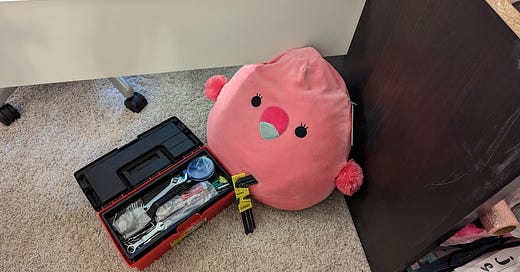A Toolbox Approach To Interviews
It is very easy for an interview process to become an ineffective gateway that only allows the same type of people into an organization. The first few times I interviewed someone I built my process around past experiences of people interviewing me. The person who hired me asked certain questions. I thought there must have been some reason why they asked those questions so I asked the same questions. I was asked to do brain teasers or on the spot coding exercises so maybe those provided some deep insight into a candidate’s problem solving skills or inner workings of their brain. Maybe those were the same questions that had gotten them hired but were they the right questions?
This led to a system that was academically challenging at best but didn’t do much to uncover how that person’s current experiences could add to the team. Worse, it quickly disqualified the people who had never encountered a problem. The only people who passed through the gate were the group who had seen that particular brain teaser or had a professor who taught the group that “modulo” was great at solving a certain set of problems. The process was doing a great job of finding people who had followed the same journey I had, but was ineffective at building and supporting a diverse group of problem solvers.
What’s in your Toolbox
I really like to map abstract concepts into the physical world. Quite often, I’ve used the wrong tool on a job only to realize days later that the frustration could have been solved with a slightly different device. Recently I was moving an Ikea piece of furniture and had lost track of the allen wrenches. I now know that those sockets are much more challenging to deal with when you don’t have a hexagon piece of metal at your side.
I’ve started to think about experience as a tool box. We slowly build up the number of tools we can access through courses, self study, and on the job training. When we encounter new problems we look through this toolbox of experiences we’ve encountered before to figure out how to shortcut the problem. When all the tools fail we fall back on using our hands to manually move the problem forward.
Multiple paths
If we start thinking about experiences as tools, we can start breaking down what a formal education actually is and start assigning credit to the alternative paths many people take. On my way through computer engineering I worked at restaurants and college dining halls which helped grow a completely different set of skills.
Let’s take someone with a 4 year bachelor’s degree. The degree shows you’re able to stick with something for 4 years and you’ve probably been exposed to rigorous individual evaluation. Maybe you’ve had to interact with a group but you may not have experienced learning to interact with a large preexisting project. It’s entirely possible that a person going through this type of program hasn’t needed to find compromise on the projects they’ve worked on because so many are tackled individually.
Now take someone who has worked in the service industry without that degree. Major skills like customer empathy are learned on a daily basis. Juggling schedules and managing complex situations forge an important set of transferable tools that easily apply across fields. I know I talked to more people on a daily basis while waiting tables than I did during a full semester of engineering classes.
Each of these paths creates a complex individual with a set of strong tools. When evaluating if someone “fits” we should be evaluating the tools they have,asking what tools are missing, and evaluating what it will take to build their skills with those tools By pulling people with a diverse toolset you might learn there are tools that you didn’t know existed to solve the hard problems confronting your organization.
A better interview
I now start technical interviews asking people to describe a project or a problem they solved or are currently excited about. This fixes a common problem I see where interviewers have been working on a hard problem for several weeks then surprise an interviewee with the same problem and evaluate them on how long it takes to get to their preferred solution. Nobody is a mind reader, interviews are stressful, and it’s better to talk to someone about something they are immersed in and excited about.
From there I try to start figuring out that person’s toolbox. One way to start is tying the skills they list on a resume to the project they’re excited about to confirm that skill. It might involve taking a critical skill needed for the team they’re interviewing for and figuring out how that maps to their past experiences. This is an active exercise that’s built to determine how far apart the individual is from the role and how much training and support is needed to get them to a place where they are effective.
The added benefit of this approach is it greatly increases the talent pool you can hire from. By building a system that both fairly evaluates individuals and provides support for them to grow their toolbox you won’t be limited to people with X degree and Y years of experience. The diverse experiences will also give the whole team a wider set of tools to draw from when confronting the hard problems.



